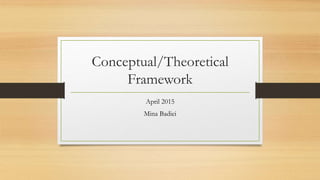Conceptual Framework
- 2. Conceptual (Theoretical) Frameworks • The key ideas that organize and shape your thinking • Should grow logically out of your literature review • Should lead to your methodology and provide a rationale for why you are proceeding in a particular way • Conceptual frameworks attempt to connect to all aspects of inquiry (e.g., problem definition, purpose, literature review methodology data collection and analysis).
- 3. Conceptual (Theoretical) Framework • Conceptual frameworks should act like maps that give coherence to your inquiry • Explains key constructs and terms, introduces or clarifies any theoretical models situates your work within prior theory and research on the question • Identifies the phenomena you propose to analyze and the justification for studying them
- 4. Conceptual (Theoretical) Framework • When purpose and framework are aligned, other aspects of the research such as methodological choices and statistical techniques become simpler to identify. • Why did you approach your problem in THIS particular way?
- 5. Writing a Conceptual Framework • Begin with an introductory paragraph introducing the elements of the conceptual framework. • Conclude with a summation that helps review the need for your study and transitions to the methodology you will use
- 6. Conceptual Framework Subheadings • Are your categories tied to the research questions? • Do you have at least one category per research question? • Research question? • Are your descriptors based on the literature? • Do they make sense? • Did you forget any descriptors? • Are your descriptors in the best order?
- 7. Examples of Conceptual Framerworks
- 8. Examples of Conceptual Framerworks
- 9. Examples of Conceptual Framerworks

